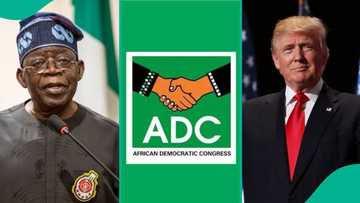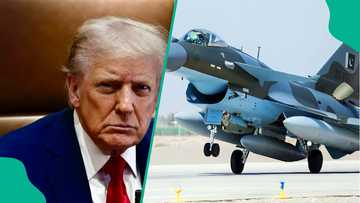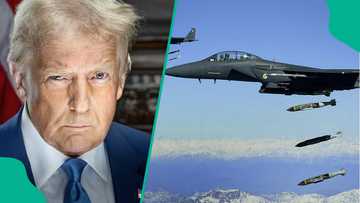11 national symbols of Nigeria and their meanings explained
A national symbol is an object, sign, or emblem belonging to a nation, often characterised by federal integration and a state of colonial independence. Such a symbol is meant to unite the country's populace by creating iconic, verbal, or visual representations of the people's history, goals, and values. National symbols are often used as part of national celebrations to showcase nationalism and patriotism. So, what are the national symbols of Nigeria today?
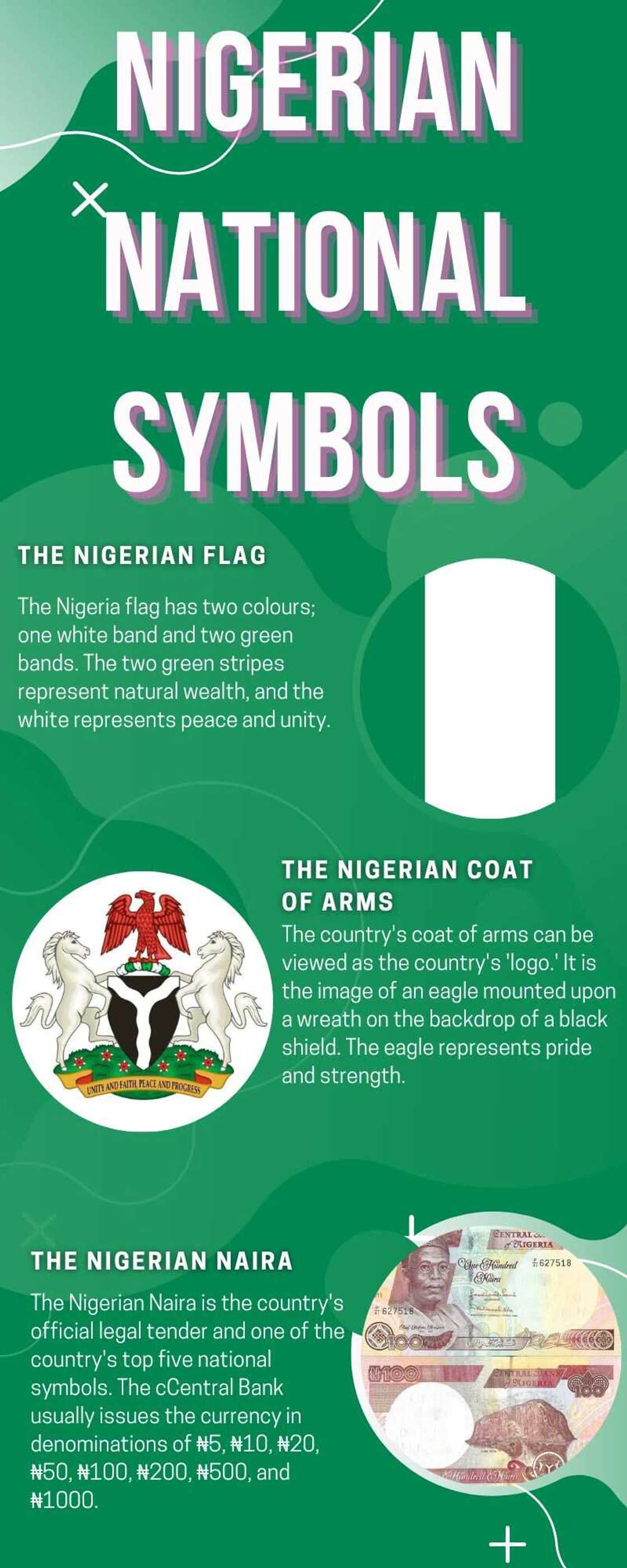
Source: UGC
TABLE OF CONTENTS
- Key takeaways
- The national symbols of Nigeria and their meanings
- What is the most important symbol in Nigeria?
- How many national symbols does Nigeria have?
- What does the black shield in the coat of arms represent?
- What are the four national symbols of Nigeria?
- What is the national symbol tree in Nigeria?
- How do Nigerians view their national symbols?
- What is Nigeria's national bird?
- What is a national symbol?
Key takeaways
- The Nigerian national symbols hold deep cultural, historical, and social significance for Nigerians.
- They represent their shared identity, aspirations, and pride in their diverse heritage.
- The National Anthem, the Nigerian flag, the coat of arms of Nigeria, the Nigerian pledge, and the Nigerian Naira are among the national symbols.
- Knowing all the 11 national symbols of Nigeria and their meanings is crucial for all citizens, as it shows patriotism.
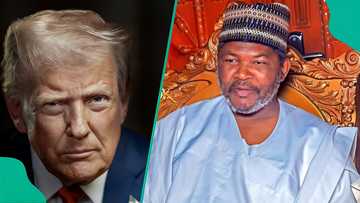
Read also
Trump's threat: Islamic scholars call for special days of prayer to ease tension across Nigeria
The national symbols of Nigeria and their meanings
National symbols create visual, verbal, or iconic representations of a country's people, values, goals, culture, and history. The Nigerian national symbols are explored below. Learn the meaning of these national symbols as well.
1. The National Anthem
The country's national anthem is one of the top 11 national symbols. The anthem takes into account the country's historical past as well as its aims and aspirations for the coming generation.
In addition, the anthem serves as a clarion call for all Nigerians to serve their motherland with zeal and faith. The anthem, known as Arise O' Compatriot, was adopted in 1978 and replaced the former National Anthem, Nigeria, We Hail Thee.
The lyrics were coined from the five best entries in a countrywide contest held to determine the new anthem. The words were put to music by Benedict Odiase, the then-director of the country's Police Band.
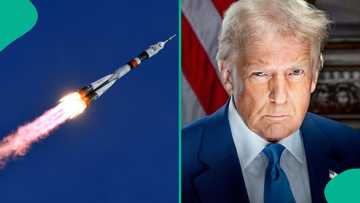
Read also
US shares video: Trump speaks on Nigerian Christians, vows to resume nuclear weapons testing
2. The Nigerian flag
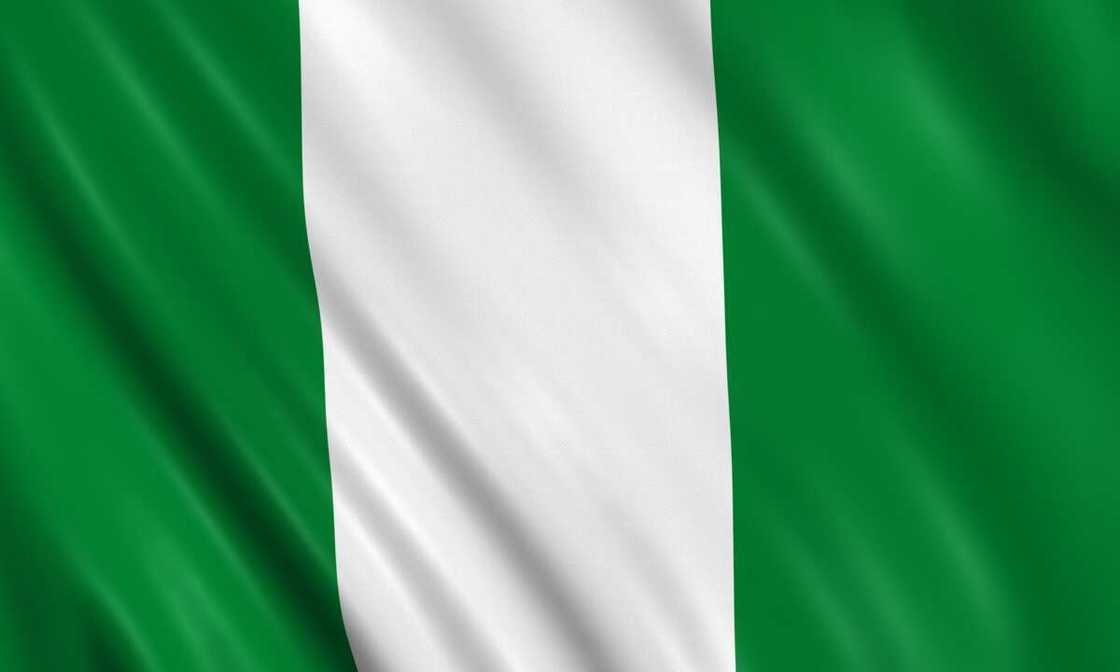
Source: UGC
The Nigerian flag is one of the 11 Nigerian national symbols. The flag has two colours: one white band and two green bands.
Before 1960, Nigeria used the British flag since it was a British colony. After it attained independence, the country adopted the current flag. The white colour in Nigeria's flag stands for peace and unity, while the two green stripes represent natural wealth.
The flag was designed in 1959 by Michael Taiwo Akinkunmi, a student at Norwood Technical College, London. Today, the country's flag is usually hoisted in front of public buildings, government houses, the National Assembly, embassies, and buildings housing major international bodies.
The flag is flown at half-mast whenever the country is experiencing serious political upheaval or mourning a renowned figure. It is also flown at half-mast to express solidarity with a friendly nation that has been befallen by tragedy.
3. The Nigerian coat of arms
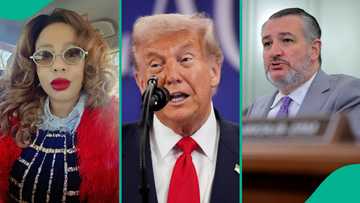
Read also
Lady mentions people who lobbied hard in America before Donald Trump's statement against Nigeria
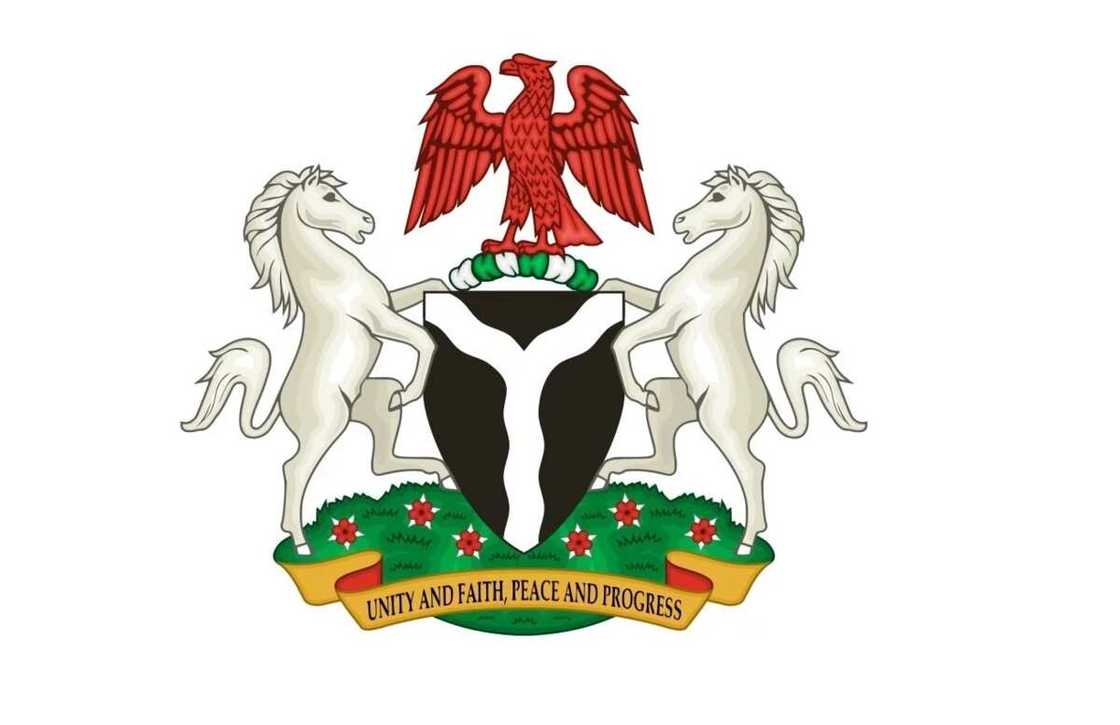
Source: Instagram
If you look up a diagram of national symbols, you will see the Nigerian coat of arms at the top, usually next to the flag. The country's coat of arms can be viewed as the country's "logo."
It is the image of an eagle mounted upon a wreath on the backdrop of a black shield. Here are the meanings of Nigerian coats of arms.
- The eagle represents pride and strength.
- The fertility of Nigeria's soil is represented by the shield's colour, which also signifies the country's vast mineral resources.
- The wavy band on the shield represents Nigeria's largest rivers, the River Benue and the River Niger.
- The two horses in the coat of arms represent strength and dignity.
- The shield's base depicts the costus spectabilis, one of the most abundant wildflowers in Africa.
- At the bottom of the coat of arms are the words' unity and faith, peace and progress.
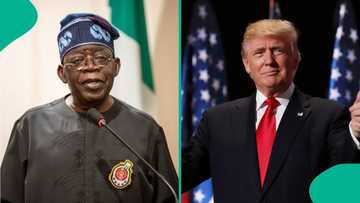
Read also
Christian Genocide: Knocks as Trump's adviser asks US to establish military base in Nig's oil state
4. The Nigerian pledge
Nigeria's national pledge is one of the top 7 Nigerian national symbols. It is an oath of allegiance to the country.
The pledge is typically recited after the anthem. Professor Felicia Adebola drafted the words in the pledge in September 1976. Shortly afterwards, then General Olusegun Obasanjo decreed that all school-going children were to recite the pledge daily.
Here are the words in the pledge.
I pledge to Nigeria, my country, to be faithful, loyal, and honest. To serve Nigeria with all my strength, to defend her unity and uphold her honour and glory. So, help me, God.
5. The Nigerian Naira
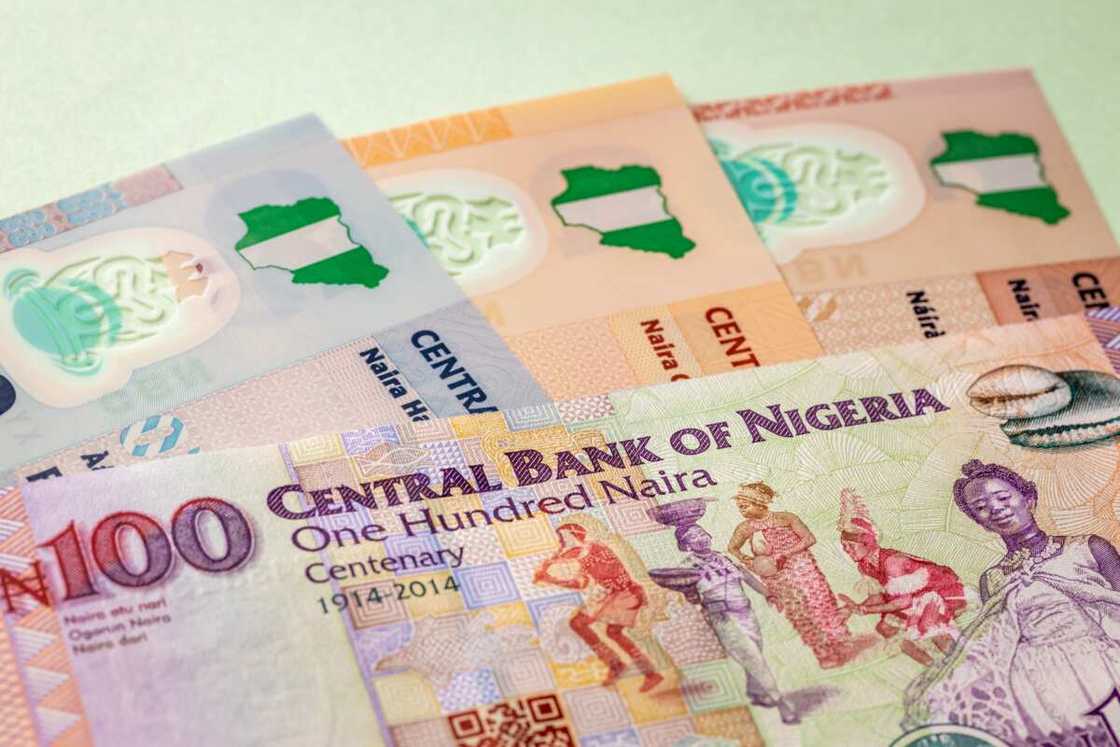
Source: Getty Images
The Nigerian Naira is the country's official legal tender and one of the country's top five national symbols. The Central Bank usually issues the currency in denominations of ₦5, ₦10, ₦20, ₦50, ₦100, ₦200, ₦500, and ₦1000.
The notes have pictures of the country's heroes, with ₦50 being the most common denomination. Besides images of well-known heroes, some of the notes also have images depicting the numerous Nigerian tribes and cultures.
6. The Nigerian armed forces
The country's armed forces consist of the Nigerian Air Force, the Navy, and the Army. These forces are tasked with defending the country's territorial integrity, making them part of the unifying national symbols in Nigeria.
Besides defending Nigeria, the armed forces also work with other nations, particularly on peacekeeping missions.
7. The national flower
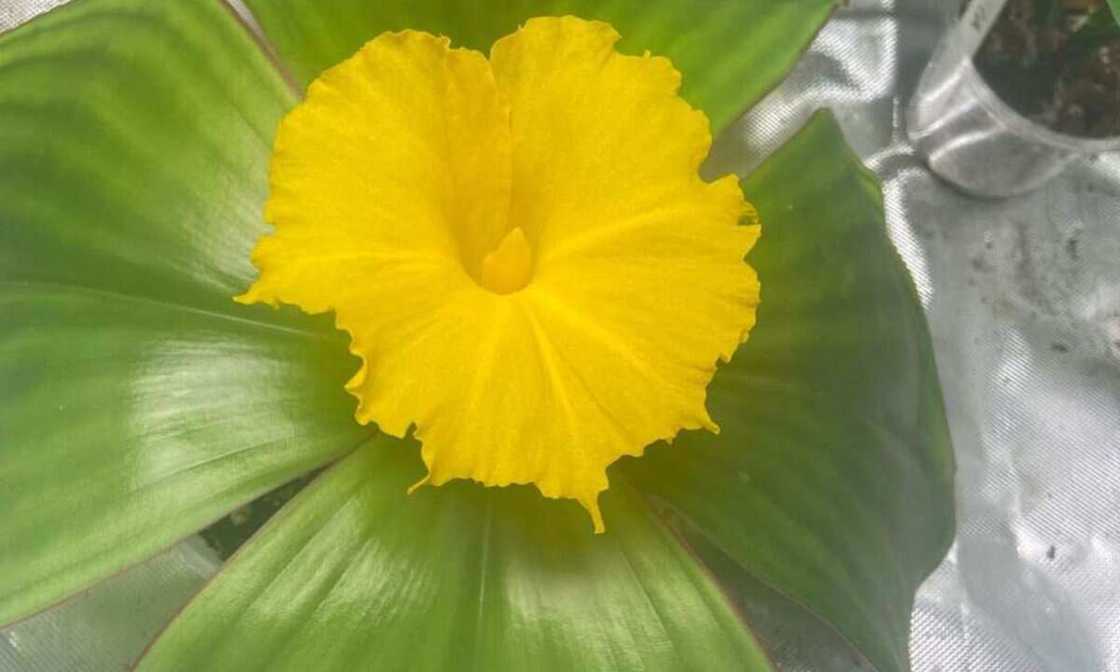
Source: Instagram
Unbeknownst to many, Nigeria has a national flower as one of its symbols. The flower in question is the Costus spectabilis, one of the most common wildflowers in the country.
There are more than 100 varieties of the flower, all with slightly varying features. Interestingly, the Nigerian coat of arms has a red variety of flowers despite the official one being the yellow variety.
8. The Seal of the Nigerian President
This is the official symbol of the country's President. It was first used in 1979 by then-President Shehu Shagari. The seal was then abandoned by the successive military regimes that ruled from 1983 to 1999.
It was then reintroduced in the wake of the fourth republic in 1999. It has remained in use since then. The seal has the image of the country's coat of arms surrounded by the words "Seal of the President of the Federal Republic of Nigeria."
9. The National Arts Theatre
The theatre is the primary venue for the performing arts in the country. The building is located in Iganmu, Surulere, Lagos. The theatre was built in 1976 in preparation for the Festival of Arts and Culture (FESTAC) 1977.
The theatre's exterior is shaped like a military hat. The inside has a 5,000-seater hall with a collapsible stage and two capacity cinema halls, all equipped with facilities for the simultaneous translation of up to eight languages.
10. The national animal of Nigeria
The eagle is Nigeria's official animal. There isn't a specific reason the bird was chosen as one of the Nigerian symbols, given it's not even found abundantly in the country.
Still, it is used to depict strength and vision. Additionally, the eagle appears in two other symbols, the country's coat of arms and the President's seal.
11. The Nigerian President
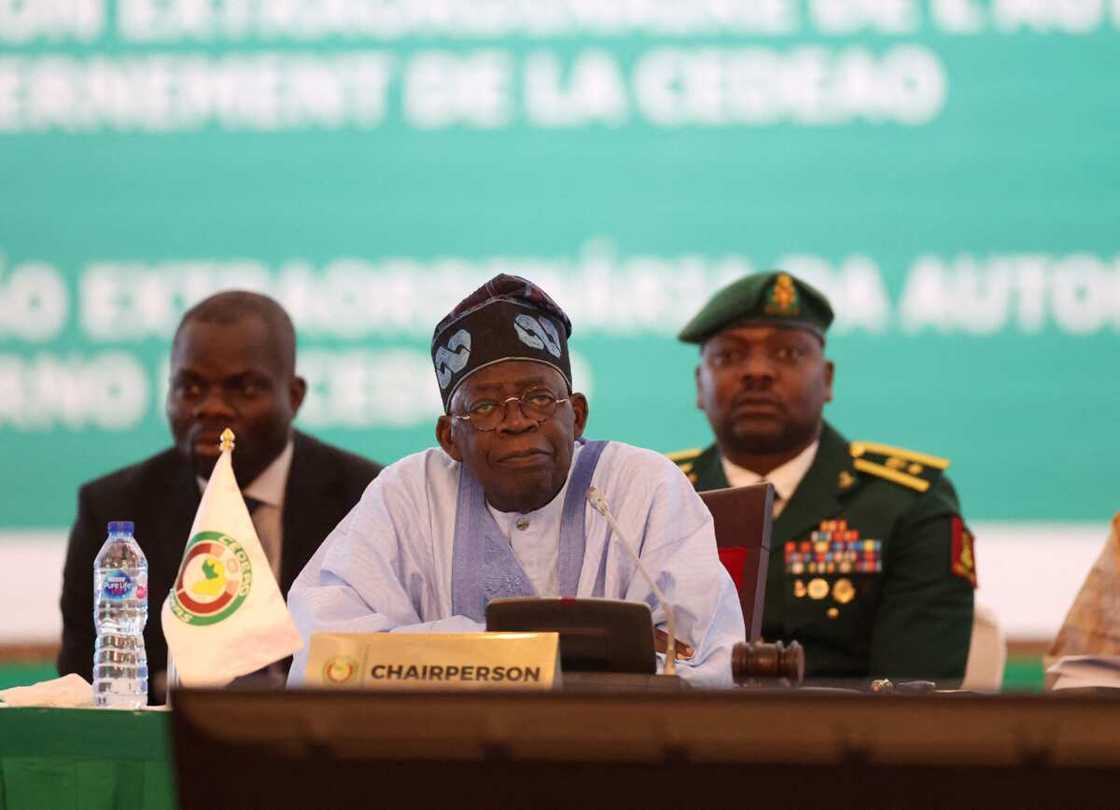
Source: Getty Images
The country's sitting president is one of the most important national symbols. The President is usually chosen by popular vote during the presidential elections every five years.
The current President is Bola Ahmed Tinubu. A picture of the President can be found in most public offices. The president is the commander-in-chief of the Nigerian Armed Forces.
What is the most important symbol in Nigeria?
While it is hard to gauge the different symbols by importance, the country's flag is arguably the most important one. Its widespread use in and out of the country underlines its essence.
How many national symbols does Nigeria have?
The country currently has 11 national symbols. They are:
- The National Anthem
- The Nigerian flag
- The coat of arms of Nigeria
- The Nigerian pledge
- The Nigerian Naira
- The armed forces
- The national flower
- The Seal of the Nigerian President
- The National Arts Theatre
- The national animal of Nigeria
- The Nigerian President
What does the black shield in the coat of arms represent?
The black shield represents the rich and fertile soil of Nigeria. Agriculture has been a fundamental part of the country's economy and sustenance for centuries.
What are the four national symbols of Nigeria?
Nigeria has 11 national symbols, and they are listed above.
What is the national symbol tree in Nigeria?
Nigeria does not have a designated national tree.
How do Nigerians view their national symbols?
Generally, Nigerians view their national symbols with respect because they symbolise national identity and unity.
What is Nigeria's national bird?
The black crowned crane is the national bird of Nigeria. It is seen as a symbol of peace.
What is a national symbol?
A national symbol is an object, sign, or emblem belonging to a nation, usually characterised by federal integration and a state of colonial independence.
Like numerous other countries across the world, Nigeria has various symbols that signify national unity. The national symbols of Nigeria are meant to unite citizens behind a common purpose and are used in different situations.
Legit.ng recently published a complete guide to Nigerian Navy ranks and the monthly salary structure for officers. Nigerian Navy officers are among the most respected people in the country.
They also earn decent salaries that attract many people. The Nigerian Navy is the naval branch of the Nigerian Armed Forces (NAF). The Nigerian Navy has a distinct ranking system compared to the Nigerian Army and the Nigerian Air Force.
Source: Legit.ng

Jackline Wangare (Lifestyle writer) Jackline Simwa is a content writer at Legit.ng, where she has worked since mid-2021. She tackles diverse topics, including finance, entertainment, sports, and lifestyle. Previously, she worked at The Campanile by Kenyatta University. She has more than five years in writing. Jackline graduated with a Bachelor’s degree in Economics (2019) and a Diploma in Marketing (2015) from Kenyatta University. In 2023, Jackline finished the AFP course on Digital Investigation Techniques and Google News Initiative course in 2024. Email: simwajackie2022@gmail.com.

Cyprine Apindi (Lifestyle writer) Cyprine Apindi is a content creator and educator with over six years of experience. She holds a Diploma in Mass Communication and a Bachelor’s degree in Nutrition and Dietetics from Kenyatta University. Cyprine joined Briefly.co.za in mid-2021, covering multiple topics, including finance, entertainment, sports, and lifestyle. In 2023, she finished the AFP course on Digital Investigation Techniques. She received the 2023 Writer of the Year Award. In 2024, she completed the Google News Initiative course. Email: cyprineapindi@gmail.com


